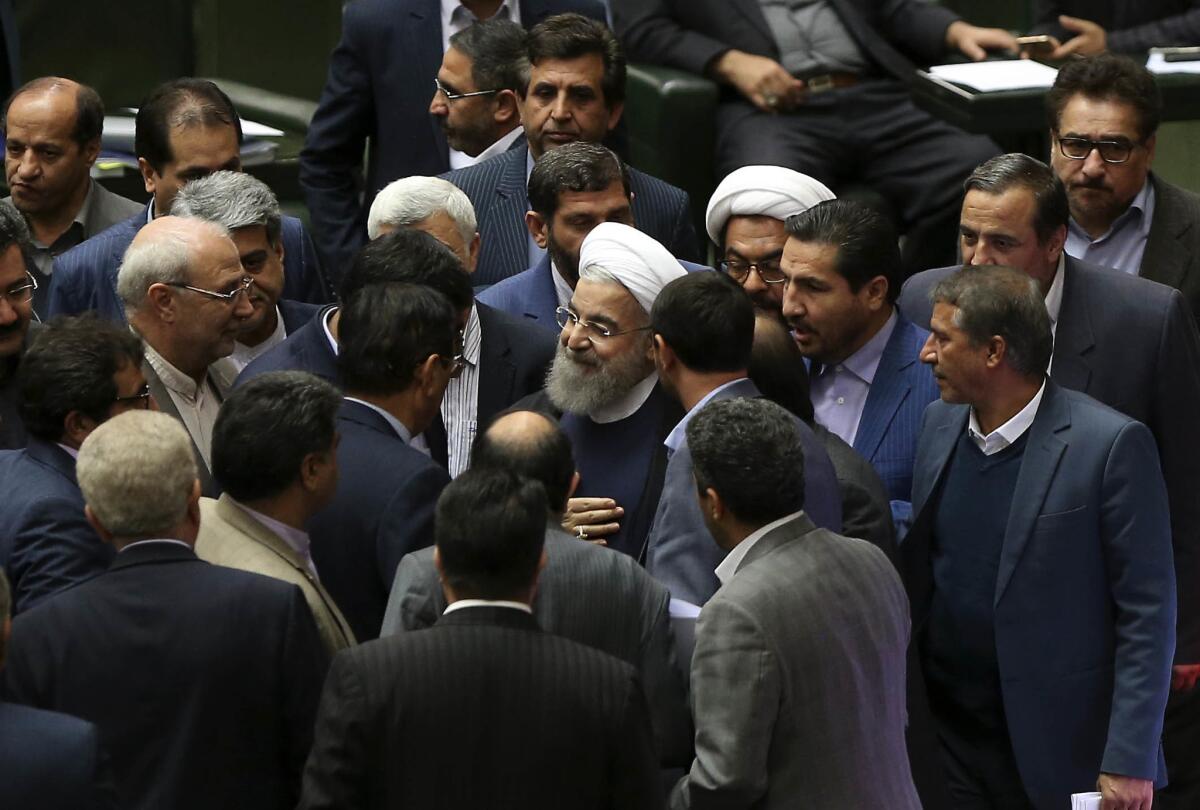Iran says it won’t walk away from the nuclear deal that Trump has threatened to ‘dismantle’

Iranian President Hassan Rouhani is surrounded by lawmakers after a speech in parliament on Sunday.
Iranian President Hassan Rouhani criticized U.S. lawmakers on Sunday for, in his view, undermining a landmark nuclear agreement but said Tehran had no intention of abandoning the deal.
In a speech to parliament, Rouhani slammed a Senate vote last week to extend for 10 years a longstanding package of trade, energy, defense and banking sanctions against Iran.
The unilateral U.S. restrictions were not rescinded by the agreement that Iran signed last year with six world powers — including the United States — to roll back its nuclear program in exchange for an easing of international sanctions.
Rouhani delivered an endorsement of the nuclear deal, a signature foreign policy achievement of the Obama administration that is under fire both from Iranian hard-liners and from President-elect Donald Trump, who has pledged to “dismantle” it.
The moderate president’s speech was aimed mainly at pacifying hard-line domestic critics who say the nuclear accord has not delivered the economic benefits he promised. Iran’s economy continues to struggle nearly one year after restrictions on oil sales and other international trade were lifted.
“The benefits of the nuclear deal are clear for everybody,” Rouhani said. “We can now, under the nuclear deal, export as much oil as possible. International transportation and shipping are much less inexpensive, and many trade and foreign investment contracts and agreements have been signed.”
Iran has argued that unilateral U.S. sanctions over Tehran’s ballistic missile program and support for terrorism dent American credibility and undermine the spirit of the nuclear deal by restricting its access to dollars, the currency of most international trade.
Whatever the American administration says or does, the Iranian government will not drop the nuclear deal, simply because Iran has no better option available.
— Nader Karimi Juni, an independent analyst in Tehran
The Senate voted 99-0 on Thursday to extend the Iran Sanctions Act for 10 years. The White House has said President Obama opposes the extension of the law but will not veto it.
“We believe the Iran Sanctions Act extension is not necessary, but we also believe it won’t interfere with the Iran deal,” White House spokesman Eric Schultz said.
Lawmakers say the extension allows the U.S. to punish Iran should the nation fail to live up to the terms of the nuclear deal.
Iranian officials, led by Supreme Leader Ayatollah Ali Khamenei, have ratcheted up anti-U.S. rhetoric in response to the continuing sanctions.
Iranian media reported Sunday that 145 lawmakers — half of the 290-member parliament — have signed a petition to boycott all American-made products. If enacted, it could imperil a reported $25-billion agreement with Boeing to upgrade Iran’s passenger airline fleet, the biggest U.S.-Iran business deal since Washington cut diplomatic ties with Tehran following the 1979 Islamic revolution.
When Rouhani said a special committee of Iran’s national security council would issue a report on implementation of the nuclear deal, chants of “Death to America!” echoed through the chamber.
Yet the nuclear deal remains popular in Iran for reducing its diplomatic isolation and in Western capitals for boosting hopes of winning Tehran’s cooperation on other thorny issues, such as battling Islamic State extremists in Syria.
In the weeks before Trump’s inauguration, both Iranian and U.S. government officials have sought to bolster the accord. CIA Director John Brennan said last week that for Trump to scrap the deal would be the “height of folly.”
Iranian Foreign Minister Mohammad Javad Zarif said over the weekend that U.S. efforts to punish Iran unilaterally were a “failed policy” but would not undermine the agreement.
“I do not believe the nuclear deal is in jeopardy,” Zarif told an audience in New Delhi. “Of course, in Iran, we have options for every alternative.”
Most analysts believe Iran has too much to risk by walking away from the deal. The Islamic Republic’s oil exports have more than doubled from a year ago, to 2.6 million barrels per day, and well-connected conservatives who criticize the deal publicly are quietly enjoying the benefits of increased trade with foreign countries.
“Whatever the American administration says or does, the Iranian government will not drop the nuclear deal, simply because Iran has no better option available,” said Nader Karimi Juni, an independent analyst in Tehran.
Despite the harsh anti-Iran rhetoric of Trump and top members of his incoming administration — including Gen. James Mattis, his choice for Defense secretary, and Lt. Gen. Michael Flynn, his national security advisor — Britain, Germany, China and other signatories continue to honor the nuclear deal. (Even Mattis has said that although he opposed the deal, he believes it is now too late to tear it up.)
“The Iranians know that if they are seen internationally as acting out of pique, it could turn into an own goal of epic proportions,” said Ali Vaez, an analyst with the International Crisis Group.
“It’d be a historic mistake for Tehran to destabilize the deal even before Trump takes over.”
Special correspondent Mostaghim reported from Tehran and staff writer Bengali from Mumbai, India.
Follow @SBengali on Twitter for more news from South Asia
ALSO
Donald Trump’s victory sparks optimism in an unlikely place: Iran
The U.S. may be the ‘Great Satan’ in Iran, but some still want to win the U.S. visa lottery
Trump’s call with the Taiwanese president was his latest break from diplomatic norms
More to Read
Start your day right
Sign up for Essential California for news, features and recommendations from the L.A. Times and beyond in your inbox six days a week.
You may occasionally receive promotional content from the Los Angeles Times.







